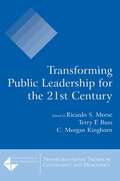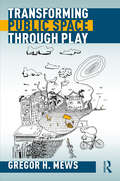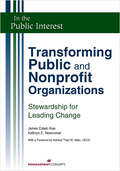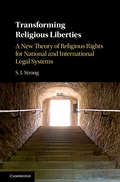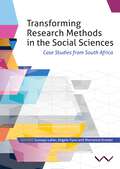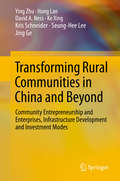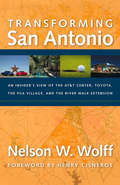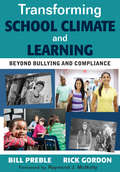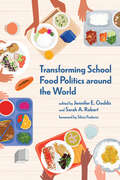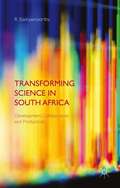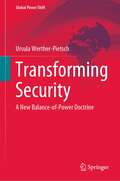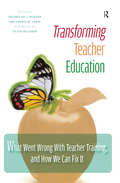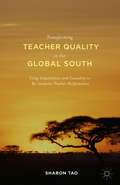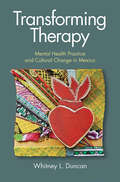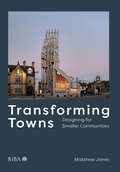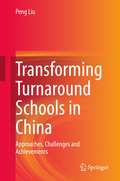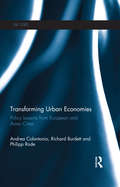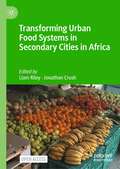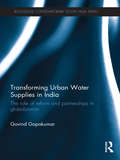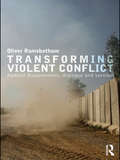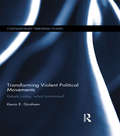- Table View
- List View
Transforming Public Leadership for the 21st Century
by Terry F. Buss Ricardo S. Morse C. Morgan KinghornThe forces of globalization are shifting our world, including the public sector, away from hierarchy and command and control toward one of collaboration and networks. The way public leadership is thought about and practiced must be, and is being, transformed. This volume in the "Transformational Trends in Governance & Democracy" series explores what the shift looks like and also offers guidance on what it should look like. Specifically, the book focuses on the role of "career leaders" - those in public service - who are agents of change not only in their own organizations, but also in their communities and policy domains. These leaders work in network settings, making connections and collaborating to create public value and advance the common good. Featuring the insights of an authoritative group of contributors, the volume offers a mix of scholarship, from philosophical discussions to conceptual models to empirical studies that, taken together, will help inform the transformation of public leadership that is already underway.
Transforming Public Space through Play
by Gregor H. MewsThis book provides an empirical analysis of the concept of play as a form of spatial practice in urban public spaces. The introduced City–Play–Framework (CPF) is a practical urban analysis tool that allows urban designers, landscape architects and researchers to develop a shared awareness when opening up this window of possibility for adventure. Two case studies substantiate and illustrate the development process and testing of the framework in Canberra, Australia, and Potsdam, Germany. The appropriation of public spaces that transcend boundaries can facilitate an intrinsic connection between people and their immediate environment, towards a more joyful ontological state of human existence in which imagination, co-creation and a sense of agency are key elements of the design approach. The framework presents an alternative understanding of public spaces and public life, reflecting on theory and its implications for practice in a post-pandemic world in dense urban centres. A bridge between theory and practice, this book explores possibilities on what future design ought to be when openness and ambiguity are consciously integrated parts of practice and process. The book presents a valuable discussion on public space and play for academic audiences across a wide range of disciplines such as landscape architecture, urban design, planning, architecture and urban sociology, which is informative for future practice.
Transforming Public and Nonprofit Organizations: Stewardship for Leading Change
by James E. Kee JD, MPA Kathryn E. Newcomer PhDIn the public and nonprofit arenas, leaders face the unique challenge of protecting the public interest while implementing organizational change initiatives. To succeed, these leaders must build organizations that are "change-centric," carefully weigh and prepare for the risks of change, and develop a change-oriented leadership style that authors Kee and Newcomer call transformational stewardship.A comprehensive approach to leading change, Transforming Public and Nonprofit Organizations: Stewardship for Leading Change provides public and nonprofit leaders and students of leadership, management, and organizational change with theoretical knowledge and practical tools for accomplishing change goals while protecting the broader public interest. This insightful and useful guide offers:An introduction to the change-oriented leadership concept, transformational stewardshipAn easy-to-follow model for initiating change in the public interestCase studies, practical tips, and resources for additional learningAn organizational assessment instrument to gauge readiness for major changeA 360-degree assessment instrument to identify individual leadership strengths and areas for improvement
Transforming Religious Liberties: A New Theory of Religious Rights for National and International Legal Systems
by Strong S. I.Religious liberties are at the centre of many debates on how liberal democratic societies can accommodate diversity. This book considers the interaction between law and religion from a broad international, comparative and jurisprudential perspective and proposes a new theoretical approach to religious liberty that both transcends and transforms current approaches to religious rights. Not only does the discussion draw on the work of a range of legal and political philosophers including John Rawls, Ronald Dworkin and John Finnis, it also tests the validity of the various proposals against actual 'hard cases' derived from multiple jurisdictions. In so doing, the analysis overcomes longstanding challenges to existing religious rights regimes and identifies a new theoretical paradigm that specifically addresses the challenges associated with religiously pluralist societies. Through this type of interdisciplinary analysis, the book identifies a religio-legal system that both religious and non-religious people can support.
Transforming Research Methods in the Social Sciences: Case Studies from South Africa
by Angelo Flynn Sherianne KramerSocial science researchers in the global South, and in South Africa particularly, utilise research methods in innovative ways in order to respond to contexts characterised by diversity, racial and political tensions, socioeconomic disparities and gender inequalities. These methods often remain undocumented – a gap that this book starts to address. Written by experts from various methodological fields, Transforming Research Methods in the Social Sciences is a comprehensive collation of original essays and cutting-edge research that demonstrates the variety of novel techniques and research methods available to researchers responding to these context-bound issues. It is particularly relevant for study and research in the fields of applied psychology, sociology, ethnography, biography and anthropology. In addition to their unique combination of conceptual and application issues, the chapters also include discussions on ethical considerations relevant to the method in similar global South contexts. Transforming Research Methods in the Social Sciences has much to offer to researchers, professionals and others involved in social science research both locally and internationally.
Transforming Rights
by Maxwell YaldenMaxwell Yalden began his career in the Department of External Affairs; he was posted to Moscow and Paris, and later as ambassador to Belguim. As Canada's Language Commissioner from 1977-1984, he worked to reinforce the Official Languages Act, and language equality, encouraging Canadians to become more inclusive in their attitudes towards both official languages. Chief Commissioner of the Canadian Human Rights Commission from 1987-1996, he also served for eight years as a member of the United Nations Human Rights Committee. Transforming Rights draws on Yalden's extensive experience in rights work to provide a personal assessment of how issues of human rights and language rights have evolved over the past forty years, both within Canada and internationally.Transforming Rights contends that Canadian rights principles reflect a unique history and character and examines the interplay of historical and contemporary Canadian standards with comparable international norms. Yalden argues that Canada's rights achievements demonstrate that though it may not be possible to change beliefs and attitudes through policy and legislation, it is certainly possible to change behaviour - facilitating the expansion of rights. Authoritative and anecdotal, Yalden offers an informed insider's opinion on continuously evolving human rights norms and the impact they have had on the way that people live their lives.
Transforming Rural Communities in China and Beyond
by Ying Zhu Hong Lan David A. Ness Ke Xing Kris Schneider Seung-Hee Lee Jing GeThis book represents one of the first attempts by a multidisciplinary research team, encompassing the social sciences, business, architecture and planning, engineering, and finance and economics, to help rural communities discover sustainable and self-reliant paths to development and transformation. The opening chapter outlines the background of the research, its importance in the context of China and other countries, the rationale for choosing the case study communities in rural China, and the composition of the research team. Chapter 2 explores key issues in the role of social entrepreneurship and leadership in rural community development. Chapter 3 analyses a green platform for a pilot transaction of China forest carbon sinks led by the Huadong Forestry Exchange. The fourth chapter examines carbon trade, forestry land rights, and the livelihoods of farmers in rural Chinese communities. Chapter 5 explores alternative energy development in rural Chinese communities, where the poor are often disproportionately dependent on fuel wood and solid biomass, causing environmental degradation, reduced productivity and the decline of income generating opportunities. Chapter 6 examines and tests the proposition that stronger communities will result from 'connected up', holistic, synergistic and inclusive planning of services and supporting infrastructure. Chapter 7 analyzes information and communications technology (ICT) based service innovations for supporting rural community enterprises. Chapter 8 highlights key elements of stronger rural communities, drawing together the themes and proposals of preceding chapters and constructing an integrated model. The authors demonstrate that interconnected community enterprises based on clean forest products, forest carbon and ecotourism can be underpinned by local infrastructure enterprises such as renewable energy, water, waste management, ICT and transport, and financial mechanisms like carbon finance, all involving skills development, leadership and social entrepreneurship coupled with corporate and investment partnerships. Such interconnected approaches are expected to generate increased employment and prosperity, improve social livelihoods, and benefit the environment.
Transforming San Antonio
by Henry Cisneros Nelson W. WolffSan Antonio boasts one of the country's fastest-growing metropolitan regions, thanks to visionary personalities, key politicians, a vibrant citizenry, and a bit of luck. In this lively behind-the-scenes account, former mayor Nelson Wolff focuses on four major developments - the San Antonio Spurs' AT&T Arena, Toyota, the PGA Village, and the River Walk expansion - that transformed the city. This intriguing, highly readable journey through the contemporary life of one American city offers hope to all cities striving to recreate themselves.
Transforming San Antonio
by Henry Cisneros Nelson W. WolffSan Antonio boasts one of the country's fastest-growing metropolitan regions, thanks to visionary personalities, key politicians, a vibrant citizenry, and a bit of luck. In this lively behind-the-scenes account, former mayor Nelson Wolff focuses on four major developments - the San Antonio Spurs' AT&T Arena, Toyota, the PGA Village, and the River Walk expansion - that transformed the city. This intriguing, highly readable journey through the contemporary life of one American city offers hope to all cities striving to recreate themselves.
Transforming San Antonio
by Henry Cisneros Nelson W. WolffSan Antonio boasts one of the country's fastest-growing metropolitan regions, thanks to visionary personalities, key politicians, a vibrant citizenry, and a bit of luck. In this lively behind-the-scenes account, former mayor Nelson Wolff focuses on four major developments - the San Antonio Spurs' AT&T Arena, Toyota, the PGA Village, and the River Walk expansion - that transformed the city. This intriguing, highly readable journey through the contemporary life of one American city offers hope to all cities striving to recreate themselves.
Transforming School Climate and Learning: Beyond Bullying and Compliance
by William K. Preble Rick M. GordonCreating safe schools from the inside out This book details a comprehensive process for empowering students and teachers as school improvement leaders and “experts.” Bill Preble and Rick Gordon explain how schools can use the SafeMeasures™ collaborative action research process to: Collect and analyze school climate data Develop improvement goals Create exciting and inspiring action plans to dramatically improve their school’s climate and student engagement Each chapter features success stories from real schools, strategies and implementation activities, and book study questions that help all stakeholders transform both their school climate and student learning.
Transforming School Food Politics around the World (Food, Health, and the Environment)
by Jennifer E. Gaddis and Sarah A. RobertHow to successfully challenge and transform public school-food programs to emphasize care, justice, and sustainability, with insights from eight countries across the Global North and South.School food programs are about more than just feeding kids. They are a form of community care and a policy tool for advancing education, health, justice, food sovereignty, and sustainability. Transforming School Food Politics around the World illustrates how everyday people from a diverse range of global contexts have successfully challenged and changed programs that fall short of these ideals. Editors Jennifer Gaddis and Sarah A. Robert highlight the importance of global and local struggles to argue that the transformative potential of school food hinges on valuing the gendered labor that goes into caring for, feeding, and educating children.Through accessible and inspiring essays, Transforming School Food Politics around the World shows politics in action. Chapter contributors include youths, mothers, teachers, farmers, school nutrition workers, academics, lobbyists, policymakers, state employees, nonprofit staff, and social movement activists. Drawing from historical and contemporary research, personal experiences, and collaborations with community partners, they provide readers with innovative strategies that can be used in their own efforts to change school food policy and systems. Ultimately, this volume sets the stage to reimagine school food as part of the infrastructure of daily life, arguing that it can and should be at the vanguard of building a new economy rooted in care for people and the environment.Contributors:Alexis Agliano Sanborn, Lisa Altmann, José Arimatea Barros Bezerra, Islandia Bezerra, Jennifer Black, Brooks Bowden, Christine C. Caruso, Cristiane Coradin, Rebecca Davis, Sinikka Elliott, Rachel Engler-Stringer, Debbie Field, Lucy Flores, Andrée Gacoin, Jennifer Gaddis, Michelle Gautreaux, Anne Hales, Karin Hjälmeskog, Anore Horton, Kristiina Janhonen, Jennifer LeBarre, Raven Lewis, Faye Mack, Marjaana Manninen, Brent Mansfield, Anne Moertel, Katsura Omori, Prerna Rana, Margaret Read, Emmanuelle Ricaud Oneto, Sarah A. Robert, Betsy Rosenbluth, Amy Rosenthal, Ludmir dos Santos Gomes, Sônia Fátima Schwendler, Amy Shollenberger, Courtney Smith, Seulgi Son, Jarrett Stein
Transforming Science in South Africa
by R. SooryamoorthyThis book is essential for anyone interested in knowing how science works nationally and internationally in the contemporary world. It offers a comprehensive analysis of scientific collaboration and its relation to development and the productivity of scientists, with specific reference to South Africa in both the past and the present.
Transforming Security: A New Balance-of-Power Doctrine (Global Power Shift)
by Ursula Werther-PietschThis book analyses the collective security system as it now stands, focusing on strategic and normative frameworks. The old system of international collective security is based on assumptions that are inadequate in relation to current challenges. Against the backdrop of changed geopolitical constellations, democracies under siege and the challenges posed by new types of warfare, critical analysts hold that not a single multilateral institution today is fully up to the task it was created for. The UN, from its founding to the Sustained Peace Approach, represents a fascinating global process of vision-building and adaptation to reality. Based on this understanding, the dynamics of the UN peace and security architecture are examined along with major agendas, from peacebuilding to development. In turn, reform proposals in the post-COVID-19 era are discussed. The book examines whether a regionalization of security structures within the UN framework may offer a way out of global fragility and growing instability factors, a question of utmost importance for conflict prevention and crisis management in the next few decades. In turn, the author discusses a normative positioning of a new intervention logic as the lowest common denominator between collaborative regional orders. Reinvented multilateralism will return as a “must.” Given its scope, the book will appeal to students and scholars of international relations and international security studies, as well as to policymakers in governments and international organizations.
Transforming Teacher Education: What Went Wrong with Teacher Training, and How We Can Fix It
by Chance W. Lewis Valerie Hill-JacksonExtracts from the text:"Why are fifteen million children and youth in poverty not achieving when we know that low-income students excel in the classrooms of “star” teachers (who comprise approximately 8 percent of the teaching force)?" "Whose needs or interests are being met in education reform today?" “In my own institution, there has not been a systematic assessment of the effectiveness of the basic teacher education program since the institution was founded over a century ago as a teachers college. Imagine, not one ever!”"Teachers who empathize with students and the life challenges they face soon realize that the dysfunctional bureaucracies will not permit them to meet the needs of their students. Half of the starry-eyed beginners are gone in five years or less." "Why does teacher education focus on the managerial, instrumental or delivery system aspects of the profession?""The expert advice dispensed by schools of education regarding what future teachers should do is not connected to any theory of learning, or to any reality of life in school classrooms." "Why has the recruitment process resulted in a cohort of teachers who are unable to connect with their students?""Does a qualified teacher equate to a quality teacher?""The best hope of getting more effective teachers from university teacher preparation programs is to base their budgets on the number of their graduates who serve in challenging schools and their effectiveness with children and youth. At the district level, the salaries of hiring officials should be based on how well these officials identify and retain quality teachers."In this book, 12 distinguished scholars provide a hard-hitting, thoroughly researched, historical and theoretical critique of our schools of education, and offer clear recommendations on what must be done to ensure all children can achieve their potential, and contribute to a vibrant, democratic society.
Transforming Teacher Quality in the Global South: Using Capabilities and Causality to Re-examine Teacher Performance
by Sharon TaoA common story of teachers from the Global South portrays them as deficient, unreliable and unprofessional. However, this book uses an innovative Capability Approach/Critical Realist lens to reveal the causal links between teachers' constrained capabilities and their 'criticised' behaviours and offer nuanced, creative strategies for improvements.
Transforming Therapy: Mental Health Practice and Cultural Change in Mexico
by Whitney L. DuncanOaxaca is known for many things—its indigenous groups, archaeological sites, crafts, and textiles—but not for mental health care. When one talks with Oaxacans about mental health, most say it's a taboo topic and that people there think you "have to be crazy to go to a psychologist." Yet throughout Oaxaca are signs advertising the services of psicólogos; there are prominent conferences of mental health professionals; and self-help groups like Neurotics Anonymous thrive, where participants rise to say, "Hola, mi nombre es Raquel, y soy neurótica."How does one explain the recent growth of Euroamerican-style therapies in the region? Author Whitney L. Duncan analyzes this phenomenon of "psy-globalization" and develops a rich ethnography of its effects on Oaxacans' understandings of themselves and their emotions, ultimately showing how globalizing forms of care are transformative for and transformed by the local context. She also delves into the mental health impacts of migration from Mexico to the United States, both for migrants who return and for the family members they leave behind.This book is a recipient of the Norman L. and Roselea J. Goldberg Prize from Vanderbilt University Press for the best book in the area of medicine.
Transforming Therapy: Mental Health Practice and Cultural Change in Mexico
by Whitney L. DuncanOaxaca is known for many things--its indigenous groups, archaeological sites, crafts, and textiles--but not for mental health care. When one talks with Oaxacans about mental health, most say it's a taboo topic and that people there think you "have to be crazy to go to a psychologist." Yet throughout Oaxaca are signs advertising the services of psicólogos; there are prominent conferences of mental health professionals; and self-help groups like Neurotics Anonymous thrive, where participants rise to say, "Hola, mi nombre es Raquel, y soy neurótica." How does one explain the recent growth of Euroamerican-style therapies in the region? Author Whitney L. Duncan analyzes this phenomenon of "psy-globalization" and develops a rich ethnography of its effects on Oaxacans' understandings of themselves and their emotions, ultimately showing how globalizing forms of care are transformative for and transformed by the local context. She also delves into the mental health impacts of migration from Mexico to the United States, both for migrants who return and for the family members they leave behind.This book is a recipient of the Norman L. and Roselea J. Goldberg Prize from Vanderbilt University Press for the best book in the area of medicine.
Transforming Towns: Designing for Smaller Communities
by Matthew JonesTowns have undergone dramatic and rapid change over the last century. Declining historic cores are surrounded by sprawling low-density housing, industrial and retail estates. The character and sense of place at the heart of rural towns and villages is under threat. By drawing people away from town centres, these developments erode the sense of community and public life. This book demonstrates how contemporary architecture, community engagement and thoughtful urban design can contribute to the creation of thriving small communities. It addresses a lack of inspiration and ideas for architects and designers working in small communities and promotes a character-based approach to designing and planning 21st century towns.
Transforming Turnaround Schools in China: Approaches, Challenges and Achievements
by Peng LiuThis book provides a holistic picture of how Chinese turnaround schools have been remarkably improved over the years and to arouse further discussion in this regard. It contributes to the understanding of school improvement from a Chinese cultural perspective, solidifies the knowledge basis of school change theories, and expands the understanding of educational administration and policies in China.
Transforming Urban Economies: Policy Lessons from European and Asian Cities (LSE Cities)
by Andrea Colantonio Philipp Rode Richard BurdettCities house the majority of the world’s population and are the dynamic centres of 21st century life, at the heart of economic, social and environmental change. They are still beset by difficult problems but often demonstrate resilience in the face of regional and national economic decline. Faced by the combined threats of globalisation and world recession, cities and their metropolitan regions have had to fight hard to maintain their global competitiveness and protect the quality of life of urban residents Transforming Urban Economies: Policy Lessons from European and Asian Cities, the first in an ongoing series of research volumes by LSE Cities, provides insights in how cities can respond positively to these challenges. The fine-grained and authoritative analysis of how Barcelona, Turin, Munich and Seoul have been transformed in the last 20 years examines comparative patterns of decline, adaptation and recovery of cities that have successfully managed to transform their economies in the face of economic hardship. This in-depth and practical analysis is aimed at urban leaders, designers, planners, policymakers and scholars who want to understand the dynamics of economic resilience while cities are still suffering from the aftershocks of the 2008 recession. The book highlights the importance of aligned and multi-level governance, the need for strategic public investments and the role of the private sector, universities and foundations in leading and guiding complex processes of urban recovery in an increasingly uncertain age.
Transforming Urban Food Systems in Secondary Cities in Africa
by Jonathan Crush Liam RileyCountries across Africa are rapidly transitioning from rural to urban societies. The UN projects that 60% of people living in Africa will be in urban areas by 2050, with the urban population on the continent tripling over the next 50 years. The challenge of building inclusive and sustainable cities in the context of rapid urbanization is arguably the critical development issue of the 21st Century and creating food secure cities is key to promoting health, prosperity, equity, and ecological sustainability. The expansion of Africa’s urban population is taking place largely in secondary cities: these are broadly defined as cities with fewer than half a million people that are not national political or economic centres. The implications of secondary urbanization have recently been described by the Cities Alliance as “a real knowledge gap”, requiring much additional research not least because it poses new intellectual challenges for academic researchers and governance challenges for policy-makers. International researchers coming from multiple points of view including food studies, urban studies, and sustainability studies, are starting to heed the call for further research into the implications for food security of rapidly growing secondary cities in Africa. This book will combine this research and feature comparable case studies, intersecting trends, and shed light on broad concepts including governance, sustainability, health, economic development, and inclusivity. This is an open access book.
Transforming Urban Water Supplies in India: The Role of Reform and Partnerships in Globalization (Routledge Contemporary South Asia Series)
by Govind GopakumarThe absence of water supply infrastructure is a critical issue that affects the sustainability of cities in the developing world and the quality of life of millions of people living in these cities. Urban India has probably the largest concentration of people in the world lacking safe access to these infrastructures. This book is a unique study of the politics of water supply infrastructures in three metropolitan cities in contemporary India – Bangalore, Chennai and Kochi. It examines the process of change in water supply infrastructure initiated by notable Public Private Partnership’s efforts in these three cities to reveal the complexity of state-society relations in India at multiple levels – at the state, city and neighbourhood levels. Using a comparative methodology, the book develops as understanding of the changes in the production of reform water policy in contemporary India and its reception at the sub-national (state) level. It goes on to examine the governance of regimes of water supply in Bangalore, Chennai and Kochi, and evaluates the role of the partnerships in reforming water supply. The book is a useful contribution to studies on Urban Development and South Asian Politics.
Transforming Violent Conflict: Radical Disagreement, Dialogue and Survival (Routledge Studies in Peace and Conflict Resolution)
by Oliver RamsbothamThis book investigates intractable conflicts and their main verbal manifestation - radical disagreement – and explores what can be done when conflict resolution fails. The book identifies agonistic dialogue - dialogue between enemies - as the key to linguistic intractability. It suggests how agonistic dialogue can best be studied, explored, understood and managed even in the most severe political conflicts when negotiation, mediation, problem solving, dialogue for mutual understanding, and discourse ethics are unsuccessful. This approach of viewing radical disagreement as the central topic of analysis and conflict management is a new innovation in this field, and also supplements and enhances existing communicative transformational techniques. It also has wider implications for cognate fields, such as applied ethics, democratic theory, cultural studies and the philosophy of difference. This book will be of great interest to students of conflict resolution, peace and conflict studies, ethnic conflict and International Relations in general. Oliver Ramsbotham is Emeritus Professor of Conflict Resolution at the University of Bradford, UK, Chair of the Oxford Research Group, President of the Conflict Research Society and co-author of Conflict Resolution in Contemporary Conflict.
Transforming Violent Political Movements: Rebels today, what tomorrow? (Contemporary Terrorism Studies)
by Kevin E. GrishamThis book explores the factors that influence violent rebellious political organisations to transform into other entities, such as political parties, criminal organisations and terrorist organisations. From the end of the Second World War until 1990, many events in the world centred on the bipolar struggle between the United States and the USSR. Although there were numerous civil wars occurring during the Cold War era, many of these conflicts went virtually unnoticed unless they were linked to the Cold War struggle for ideological dominance. In the aftermath of the fall of the Soviet Union, the number of intra-state conflicts was prevalent around the globe. Along with the occurrence of civil wars, a variety of violent political movements also developed. Examining cases from Latin America, Africa, Europe, and Asia, this book addresses how violent political movements transform during and after conflict into new types of organisations using the collective political violence transformative (CPVT) model. The study uses a combination of pre-existing literature from the fields of sociology and political science, archival research, and interviews with movement members (former and active) conducted by the author. In studying the Provisional IRA and Sinn Féin, the Spear of the Nation (MK) and the African National Congress (ANC), the Abu Sayyaf Group and the Revolutionary Armed Forces of Colombia (FARC-EP), Transforming Violent Political Movements paints a picture of organisations that have to respond to their environments to survive. This book will be of much interest to students of political violence, terrorism, war and conflict studies, security studies and IR.
